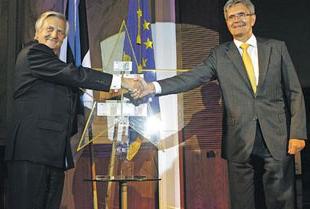Budget, Economics, Estonia, EU – Baltic States, Financial Services
International Internet Magazine. Baltic States news & analytics
Wednesday, 18.12.2024, 19:16
Estonia will be the first country to join the euro region since the crisis gripped Europe
 Print version
Print version |
|---|
"We are at sea in a small boat tied to an ocean liner," Estonian Finance Minister Jurgen Ligi said by e-mail. "In a storm or otherwise, we'd feel better being on board."
As countries including the Czech Republic and Poland balk at adopting the euro after members were forced to bail out Ireland and Greece, Estonian support for the common currency is rising. Backing for the euro rose to 54% in November from 49% the previous month as a government campaign helped blunt concern about the debt crisis, according to a poll commissioned by the Cabinet. A new survey is due out next week.
Estonia on January 1 will be the first country to join the euro region since the crisis gripped Europe. The former Soviet republic of 1.3 million people, which in the past two decades shaped its economy after Ireland, is counting on eliminating currency risk in a nation already dependent on euro-denominated loans and trade, writes LETA/Bloomberg.
"We should move on as a country, and I think this will give more chances to Estonia and its people to improve their life," said Igor Beloborodov, a 23-year old client-service representative. "I'm not worried by the Irish events."
More than 90% of Estonian private loans are in euros, with most of them tied to the euro interbank offered rate, or Euribor, central bank data show.
"What the euro zone offers is risk sharing," said Agnes Belaisch, a London-based strategist at Threadneedle Asset Management Ltd., which oversees 100 billion dollars. "There are clear advantages of having big brothers."
The added security of euro-area membership helped persuade Statoil Fuel & Retail ASA, the biggest fuel retailer in the Nordic countries, to set up its financial center in Estonia. It spent 270 million euros, the biggest foreign investment in the Baltic country this year.
"We could have located the center in any of the three Baltic states or in Poland," Chief Financial Officer Klaus – Anders Nysteen said by phone. "Estonia's entry into the euro zone was very important to our decision and definitely gave added value to the location."
The kroon's exchange rate has been fixed since its 1992 introduction, first to the deutsche mark, then to the euro. The country resisted calls from economists including Paul Krugman and Nouriel Roubini to fight the EU's second-deepest recession by abandoning the peg, opting to cut costs and raise taxes.
The currency became an advantage among the former communist countries of eastern Europe that agreed to work toward adopting the euro when they joined the trading bloc in the last decade.
Poland, Romania, the Czech Republic and Hungary, the group's four largest countries, use versions of floating currency regimes and are further from qualifying for euro adoption than Bulgaria, Latvia and Lithuania, which have fixed exchange rates, said Fredrik Erixon, director of the European Centre for International Political Economy in Brussels.
"If there will be another round of expansion before" the second half of the decade, "it is the remaining Baltic countries plus Bulgaria that are in line," Erixon said in an e- mail.
Estonia followed Ireland's example of betting on foreign investment to drive growth. Estonia abolished the corporate income tax on reinvested profits in 2000, attracting Swedish and Finnish companies to its banking, telecommunications and electronics industries.
Estonia’s economic growth averaged 7.2% from 1995 to 2007 as Nordic lenders expanded their influence to more than 90% of the financial industry. The country kept its budget deficit within the EU limit of 3% of economic output every year except 1999.
Budget discipline helped Estonia keep its public debt at the EU's lowest level, 8% of GDP this year, according to a European Commission estimate. In Ireland, the economic expansion and easy credit fanned a real estate bubble, leading to a 97% debt level.
Ireland needed an 85 billion-euro aid package after predicting its budget deficit would swell to 32% of economic output this year, the highest in the euro's 12-year history. With Greece's 110 billion-euro bailout, the crisis exposed flaws in the euros makeup and fueling doubts whether the 16 countries belong in the same currency union.
The consensus among Scandinavian investors two years ago was that Estonia would have to devalue the kroon to exit one of the world’s worst recessions, halting the flow of investment, said Joakim Helenius, executive chairman of Tallinn-based investment bank Trigon Capital.
Some Estonians say the country should continue focusing on its own economic development instead of relying on the debt- ridden euro area.
The currency switch may lead to "massive" price increases and its "one-size-fits-all" monetary policy, which "mimics Soviet imperial illusions" are wrong for the country, Anti Poolamets, a lawyer who organized an anti-euro movement, wrote November 21 on the website Delfi owned by Estonia-based media company Ekspress Grupp, the only publicly traded media company in the Baltic region.
A poll commissioned by Poolamets in October showed that 52.8% of the 1,524 respondents in the survey opposed euro adoption. While the government asked people if they wanted to adopt the euro, the competing poll also highlighted the loss of the kroon, Poolamets said.
The opposition is myopic, according to central bank Deputy Governor Marten Ross. "Criticism of the timing of Estonia's euro entry reminds of cases where strategic decisions have been overshadowed by tactical considerations that in the end haven't yielded any gains," he wrote in an e-mail.








 «The Baltic Course» Is Sold and Stays in Business!
«The Baltic Course» Is Sold and Stays in Business!

